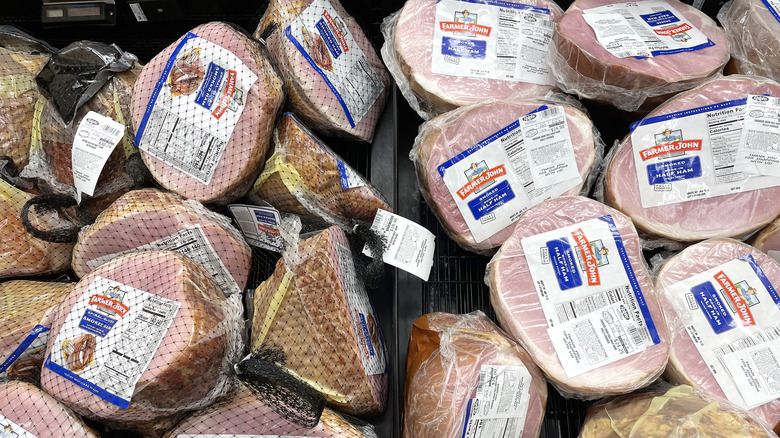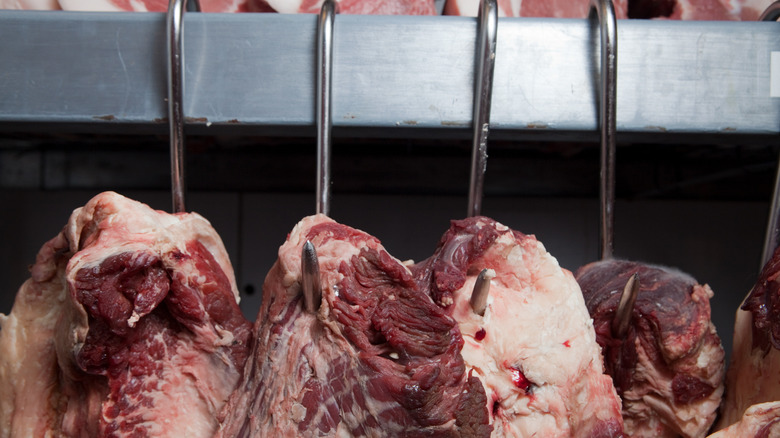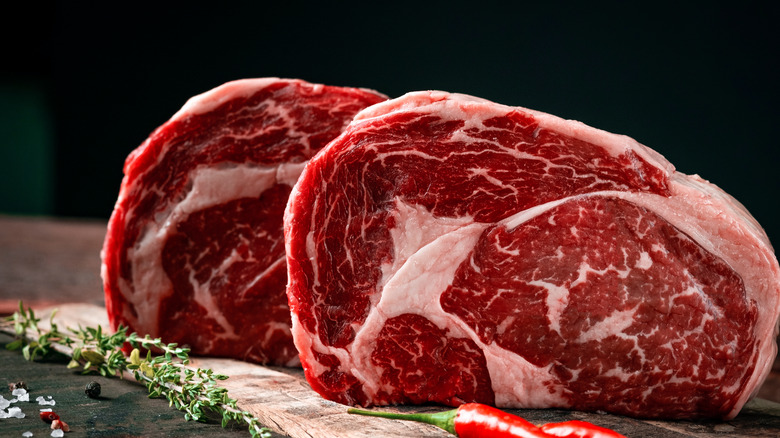Why It's Good To Know If Your Local Butcher Sells More Than Raw Meat
Visiting your local butcher can be a great way to ensure you get quality meat. While supermarkets can be more convenient and cheaper, butchers offer unmatched expertise when it comes to prime cuts. At the same time, you want to be sure that your butcher is worth that extra expense and knows their sirloin from their ribeye, so to speak. Fortunately, there are a couple of key signs of a good butcher — one of which may be surprising.
If your butcher sells more than just raw meat, then it's likely that they're one of the good ones. While raw meat is the specialty of a butcher, the hallmarks of a good butcher's shop include salted and cured meats as well as roasts and other items. In an interview with The Kitchn, Indianapolis butcher Corrie Cook explained the rationale, "A meat shop that knows how to do more than cut is a good sign of a well-trained crew who like to cook (and eat) as much as you do."
Selling prepared foods shows that the butcher is passionate about their job and isn't cutting corners when it comes to work. If you're seeking out a specialist, then these are good traits for them to have. Otherwise, you could have just gone to the supermarket.
Other signs of a good butcher
Among the qualities of a good butcher are being highly knowledgeable about their craft and also practicing good hygiene. While there may be some blood, if you walk into a butcher's shop and it looks like a horror movie set, then that is a worrisome sign. In particular, consider the overall cleanliness of the floor, especially on the sales floor. Likewise, is there any blood on the butcher? It's important to consider whether the shop is sanitary, especially since you're planning to buy meat there.
Overall, a good butcher is also extremely knowledgeable when it comes to animals and the selection of meat. They'll likely know the conditions that the animal lived under and if the animal was slaughtered humanely. Likewise, many butcher shops also source their meat locally from nearby ranches and farms, so your butcher should be able to tell you exactly where the meat came from. When shopping, it's important to ask questions about the cuts that you're planning to buy. You don't have to throw your butcher into an integration room and go good cop, bad cop, but any butcher worth visiting will be able to answer these basic questions about their meat.
Finding a good butcher
Finding a good local butcher can be a bit daunting for those who don't know where to start. There's a reason that many people still choose to get their meat at the grocery store, but don't let the uncertainty of finding a local meat expert scare you off. In the digital age, it's easier than ever to find businesses in your community. Check out social media for any local butcher shops. Be sure to look at recent reviews as well. Farmers markets are sometimes a good way to find a new butcher as local vendors will often sell their products in pop-up stalls.
When it comes to quality, the meat doesn't lie. It's usually a good sign if your butcher shop sells more than just raw cuts of meat. Smoked and cured meats show they take time to hone their craft and stock selections beyond just the bare minimum. Likewise, you'll be able to tell if you have a quality cut of meat based on both the color and odor. For instance, red meat should have a deep red pigment. Likewise, if the meat smells off, then you should probably stay away as it may have gone bad. If they're serving quality meat and know the ins and outs of the trade, then butcher shops are worth the added visit.


